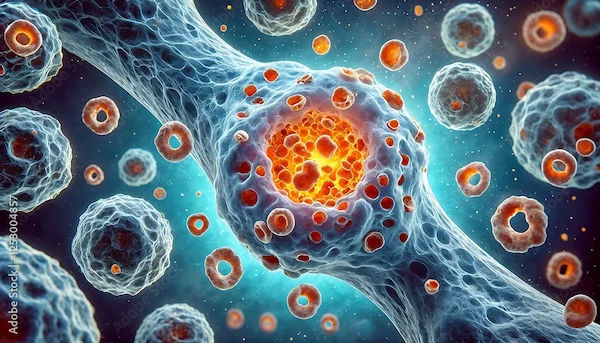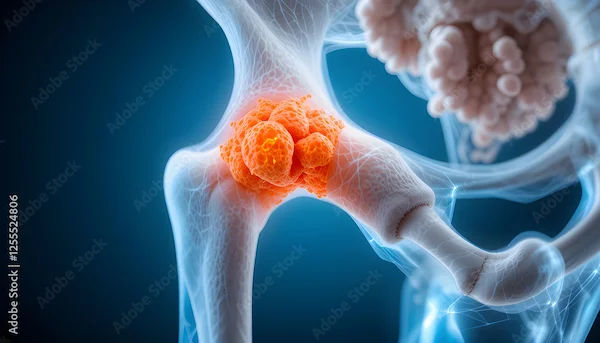Tailbone Pain and Cancer Symptoms Explained
Understand the link between tailbone pain and cancer symptoms. Learn to differentiate common causes of coccyx discomfort from potential serious indicators, and know when to seek medical evaluation for persistent or worsening tailbone pain.

Written by Dr. J T Hema Pratima
Reviewed by Dr. D Bhanu Prakash MBBS, AFIH, Advanced certificate in critical care medicine, Fellowship in critical care medicine
Last updated on 7th Aug, 2025

Tailbone pain, also known as coccydynia, can be uncomfortable and worrisome. While most cases are due to minor injuries or strain, some people may wonder if tailbone pain could be a sign of something more serious, like cancer. In this article, we’ll explore the common causes of tailbone pain, when it might be related to cancer, and what steps you can take to manage and treat it.
Understanding Tailbone Pain
The tailbone, or coccyx, is a small triangular bone at the bottom of the spine. Pain in this area can range from mild discomfort to severe, sharp pain that worsens when sitting or moving.
Common Causes of Tailbone Pain
Most tailbone pain is not related to cancer. Some frequent causes include:
Injury or Trauma – A fall, direct hit, or prolonged sitting on a hard surface can bruise or fracture the tailbone.
Pregnancy & Childbirth – The tailbone can shift during delivery, leading to pain afterward.
Poor Posture – Slouching or sitting in awkward positions for long periods can strain the coccyx.
Repetitive Strain – Activities like cycling or rowing may irritate the tailbone over time.
Infection or Abscess – Rarely, an infection near the tailbone (pilonidal cyst) can cause pain.
When Could Tailbone Pain Be Related to Cancer?
While rare, tailbone pain can sometimes be linked to cancer, particularly if:
The pain is persistent and worsening without any injury.
There is unexplained weight loss, fatigue, or night sweats.
The pain is accompanied by numbness, weakness, or bowel/bladder issues (which could indicate spinal cord pressure).
There is a history of cancer (especially prostate, colorectal, or bone cancer).
Note: Most tailbone pain is not cancer-related, but if you have concerning symptoms, it’s best to consult a doctor.
Consult Top Oncologist For personalised Tips
Managing Tailbone Pain at Home
If your pain is mild and not linked to a serious condition, these tips may help:
Use a Donut Pillow – A cushion with a hole in the center reduces pressure on the tailbone while sitting.
Apply Ice or Heat – Ice packs can reduce swelling, while a warm compress may ease muscle tension.
Take OvertheCounter Pain Relievers – Medications like ibuprofen or acetaminophen can help with discomfort.
Practice Good Posture – Sit straight and avoid slouching to prevent extra strain.
Gentle Stretches – Pelvic floor exercises and yoga can help relieve tension in the lower back.
When to See a Doctor?
Seek medical attention if:
The pain doesn’t improve after a few weeks.
You experience severe pain, swelling, or signs of infection (redness, fever).
There are neurological symptoms (numbness, tingling, weakness in legs).
You have unexplained weight loss or a history of cancer.
A doctor may recommend:
X-rays or MRI to check for fractures or other issues.
Physical therapy for strengthening and pain relief.
Injections (like corticosteroids) for severe inflammation.
Referral to a specialist if cancer or another serious condition is suspected.
Final Thoughts
Tailbone pain is usually not a sign of cancer, but persistent or severe discomfort should not be ignored. Simple home remedies can often help, but if your symptoms worsen or include red flags like unexplained weight loss, consult a doctor for further evaluation.
If you're concerned about your tailbone pain or need expert advice, you can book a consultation with an orthopedic specialist or pain management doctor through Apollo 24|7. Early diagnosis and treatment can help you get back to a painfree life!
Stay informed, stay healthy!
Consult Top Oncologist
Consult Top Oncologist For personalised Tips

Dr. Rupam Manna
Radiation Specialist Oncologist
4 Years • MBBS MD(RADIO THERAPY)
Barasat
Diab-Eat-Ease, Barasat

Dr Gowshikk Rajkumar
Oncologist
10 Years • MBBS, DMRT, DNB in Radiation oncology
Bengaluru
Apollo Clinic, JP nagar, Bengaluru

Dr Sunita Samleti
Oncologist
18 Years • M.D. (Pathology)- TN Medical College, Mumbai University, Mumbai, Mar 2005 M.B.B.S. Grant Medical College, Mumbai University, Mumbai, Oct 1999
Chinagadila
Apollo Hospitals Health City Unit, Chinagadila
Dr. B Shravanthi Reddy
Radiation Specialist Oncologist
8 Years • MBBS, DNB(Radiation Oncology)
Manikonda Jagir
Apollo Clinic, Manikonda, Manikonda Jagir

Dr.sanchayan Mandal
Oncologist
17 Years • MBBS, DrNB( MEDICAL ONCOLOGY), DNB (RADIOTHERAPY),ECMO. PDCR. ASCO
Kolkata
Dr. Sanchayan Mandal Oncology Clinic, Kolkata
Consult Top Oncologist

Dr. Rupam Manna
Radiation Specialist Oncologist
4 Years • MBBS MD(RADIO THERAPY)
Barasat
Diab-Eat-Ease, Barasat

Dr Gowshikk Rajkumar
Oncologist
10 Years • MBBS, DMRT, DNB in Radiation oncology
Bengaluru
Apollo Clinic, JP nagar, Bengaluru

Dr Sunita Samleti
Oncologist
18 Years • M.D. (Pathology)- TN Medical College, Mumbai University, Mumbai, Mar 2005 M.B.B.S. Grant Medical College, Mumbai University, Mumbai, Oct 1999
Chinagadila
Apollo Hospitals Health City Unit, Chinagadila
Dr. B Shravanthi Reddy
Radiation Specialist Oncologist
8 Years • MBBS, DNB(Radiation Oncology)
Manikonda Jagir
Apollo Clinic, Manikonda, Manikonda Jagir

Dr.sanchayan Mandal
Oncologist
17 Years • MBBS, DrNB( MEDICAL ONCOLOGY), DNB (RADIOTHERAPY),ECMO. PDCR. ASCO
Kolkata
Dr. Sanchayan Mandal Oncology Clinic, Kolkata


